Bowel resection for colorectal cancer: Overview
Resection is another name for any surgery that removes tissue or part of an organ. Bowel resection for colorectal cancer, also called partial colectomy, removes the tumor. To make sure that only healthy tissue is left, the doctor removes a small amount of healthy colon or rectum tissue on both sides of the tumor.
The goal of bowel resection is to take out the part of the colon or rectum where the cancer is. Nearby lymph nodes are taken out and tested for cancer. Then healthy parts of the colon or rectum are sewn back together. Bowel resection is done either by opening the abdomen (open resection) or by laparoscopy.
Why is a bowel resection done?
Bowel resection may be done to remove cancer or when the bowel cannot function normally because of damage or disease. You may need a bowel resection if you have:
- A bowel obstruction.
- Colon cancer.
- Crohn's disease.
- Diverticulitis.
Bowel resection for colorectal cancer
Anatomy of the colon and rectum
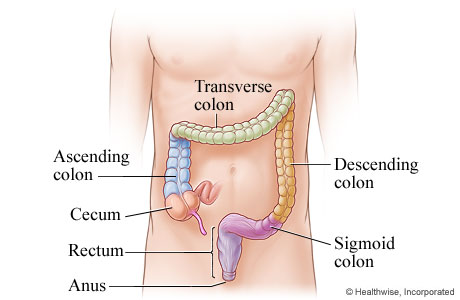
The colon and rectum are the last parts of the bowel (intestine). The bowel extends from the opening where food leaves the stomach to the opening where feces leave the body (anus). The bowel helps to process food, absorb nutrients and water, and get rid of waste.
Colon cancer site
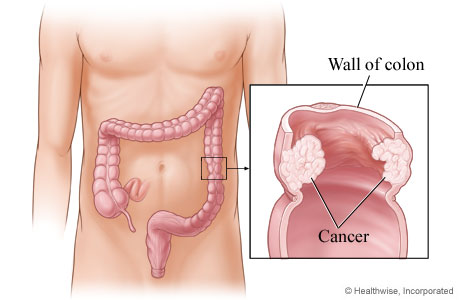
Cancer is shown in a section of the descending colon.
Bowel section removed
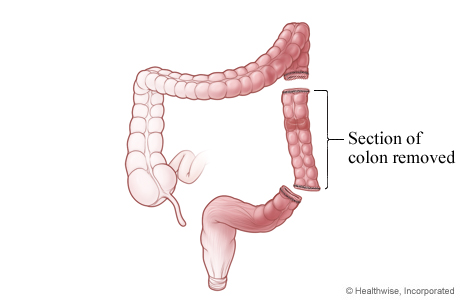
Resection is another name for any surgery that removes tissue or part of an organ. Bowel resection, also called partial colectomy, for colorectal cancer removes the tumor and part of the colon or rectum around the tumor. Both ends of the bowel section being removed are stapled and cut. Nearby lymph nodes, lymph drainage channels, and blood vessels are also removed.
Bowel reattached
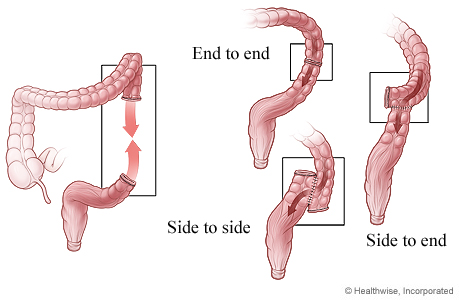
The remaining ends of the bowel are reattached, either end-to-end, side-to-side, or side-to-end.
Surgery scars
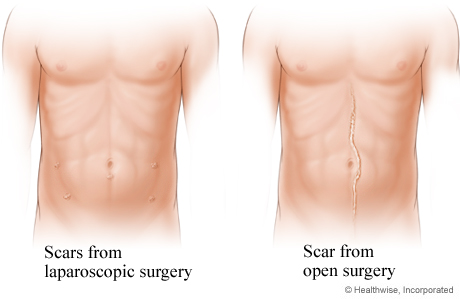
If you have laparoscopic surgery, you will have 3 to 6 small scars. An example is in the picture on the left. Your surgeon may make 1 or 2 of the small openings a little bigger to allow space to complete the surgery. If so, those scars will be a little longer than the others. If you have an open resection, you will have one long scar. An example is in the picture on the right.
How well does a bowel resection work?
Most people who have surgery for invasive cancer do not have the tumor return. The likelihood of success depends on many factors, such as the stage of the cancer.
A small number of people who have surgery for diverticulitis develop diverticulitis again within 5 years. But another surgery is usually not needed.
Surgery is not a cure for Crohn's disease. When surgery for Crohn's is needed, as little of the intestine as possible is removed to keep the intestines working normally. The disease tends to return to other areas of the intestines after surgery. About one-quarter of Crohn's disease patients who have a first surgery also have a second. And many of these second ones are within 5 years of the first surgery. In children, surgery may improve well-being and quality of life and restore normal growth and sexual development.
If a colostomy is needed during the bowel resection, usually it is temporary, until the colon or rectum heals. If the lower part of the rectum has been removed, the colostomy is permanent.
©2011-2026 Healthwise, Incorporated
